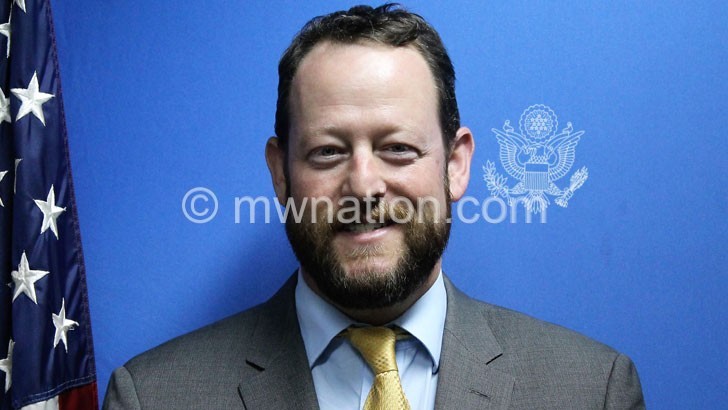Malawi’s compact fate in December
Following a failed meeting between President Peter Mutharika and Millennium Challenge Corporation (MCC) executives in New York, Malawi will have to wait until December when the MCC Board will decide on eligible countries for the next compact financing.
In a written response to a questionnaire, United States of America (USA) Embassy public affairs officer Douglas Johnston confirmed about the impending meeting following the expiry on September 20 2018 of the $350.7 (about K245 billion) MCC compact in Malawi that financed Power Sector Reforms.

He said: “Selection for a second compact is not automatic. MCC has a higher bar for second compact eligibility, including successful implementation of the first compact, improved scorecard policy performance and a commitment to pursue sectoral reforms.
“MCC’s Board will also look at how the government maintains and builds on the significant investments that have been made to strengthen Malawi’s power sector.
“In the event the Board does not select Malawi for a second compact in December, that does not preclude consideration in future years.”
Johnston said the five-year MCC compact with the Government of Malawi officially ended on September 20 2018, but financial and contractual elements of the contracts would wrap up by January 2019.
Critical criteria in the assessment tools to be used for assessing eligibility for the second compact will include how the country is fairing in the fight against corruption which is a crucial indicator on the MCC scorecard.
The 2017 MCC scorecard indicated that the country scored 16 out of 20 indicators. However, Malawi was seen as sliding backwards on corruption.
It transpired that Malawi scored 57 percent on corruption in 2017 below its 2016 performance, triggering fears of hitting 50 percent or below which puts countries off track from being eligible.
Mutharika, who is scheduled to return home today from the 73rd United Nations General Assembly (Unga) which ended about a week ago, missed a crucial meeting in New York to discuss a second compact grant with MCC after failing to make it at the appointed time.
Presidential press secretary and spokesperson Mgeme Kalilani is on record as having said that senior officials from the MCC—financiers of the compact—returned to Washington DC from New York without meeting the President and his team after waiting in vain at the proposed venue.
In a WhatsApp response, Kalilani said: “The President drove down to the UN headquarters to attend the official opening of the Unga. As fate would have it, the Unga delayed and it overrun to the scheduled time for the MCC meeting.
“The President was caught up in this situation and the MCC team was informed accordingly that the President would not make it to the hotel by 11.30am. The MCC team was informed that the President’s next available time for the meeting was at 16:30 hours after addressing the general assembly.”
Before the President’s US trip, Minister of Finance, Economic Planning and Development Goodall Gondwe said Mutharika was scheduled to meet MCC acting chief executive Brock Bierman in New York to discuss the way forward on the second Malawi compact after the successful implementation of the five-year energy compact.
MCC last month reported to the US Congress that Malawi remained an eligible recipient of its support owing to the country’s low per capita income as per a World Bank assessment.
US Ambassador Virginia Palmer and Gondwe were quoted as having confirmed the planned negotiations between Mutharika and MCC executives.
Malawi was rated as having performed well on the 2018 MCC scorecard, having passed half of the 20 indicators given.
Through its local implementing agency, the Millennium Challenge Account-Malawi (MCA-M), MCC has funded the rehabilitation, modernisation and upgrading of the 1966 built 24-megawatts Nkula A Hydro Power Plant.
Project goals included increasing Nkula A’s generation capacity from 24MW to 36MW.
When contacted on the way forward after the failed meeting in New York, MCA-M officials referred the matter to the US Embassy in Lilongwe.
But the US Embassy said it was still consulting on the matter.
Apart from the Nkula A rehabilitation, some of the major works the MCC compact has done include increasing transmission capacity from 132 kilovolts (kV) to 400 kV whereas works on Nkhoma, Luwinga and Bwengu substations would be completed.
Commenting on the fight against corruption in the country, Gift Sambo, a lecturer in political sciences at Chancellor College—a constituent college of the University of Malawi (Unima), appealed to government to walk the talk on fighting the vice to benefit from the second compact.
He said: “The major problem that we have is that there is no political will to fight against corruption. We have seen the government failing to accord the Anti-Corruption Bureau [ACB] the support it deserves.
“The fight against corruption is determined by those in power. We have seen corruption suspects being shielded just because they have defected to the ruling party. Free ACB and provide it with both human and financial resources.
But Minister of Information and Communications Technology Nicholas Dausi, the official government spokesperson, said the government was determined to qualify for the second compact.
In a telephone interview, he said: “As government, we are aware of what is expected of us in as far as qualifying for the second MCC compact is concerned. We have done a lot better and we are making strides to improve in the other remaining indicators, including the fight against corruption.”
Despite the country sliding on both local and international corruption perception indices, the President has often accused the media and civil society organisations of exaggerating the corruption trends in the country.





